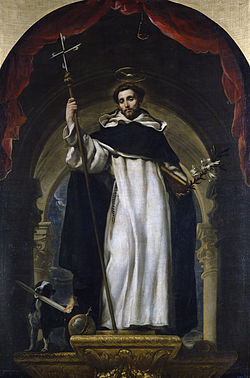 | |
| Gender | Male |
|---|---|
| Origin | |
| Word/name | Latin (Dominicus) |
| Meaning | lord |
| Other names | |
| Related names | Dominicus, Domingo, Dominique, Dominykas, Dominika, Dominica |
| A common Roman Catholic name given to a male child born on a Sunday | |
Dominic, Dominik or Dominick is a male given name common among Roman Catholics and other Latin-Romans. Originally from the late Roman-Italic name "Dominicus", its translation means "Lordly", "Belonging to God" or "of the Master". [1] [2]
Contents
- People
- Saints
- Other religious figures
- Art
- Business
- Film and television
- Literature
- Media
- Military
- Music
- Politics
- Science and medicine
- Sports
- Other professions
- Fictional characters
- See also
- References
The most prominent Roman Catholic with the name, Saint Dominic, founded the Order of Preachers, also known as Dominican friars. Saint Dominic himself was named after Saint Dominic of Silos.
Variations include Dominicus (Latin rendition), Domenic, Domenico (Italian), Domanic, Dominiq, Domonic, Domènec (Catalan), Domingo (Spanish), Dominykas (Lithuanian), Domingos (Portuguese), Dominggus and Damhnaic (Irish). Feminine forms include Dominica, Dominika, Domenica, Dominga, Domingas, as well as the unisex Dominique, of French origin. [3]
Notable people named Dominic, Dominik or Dominick include: